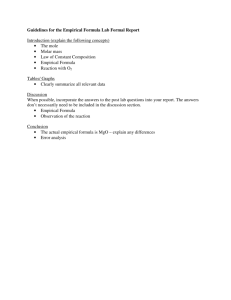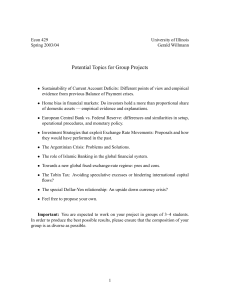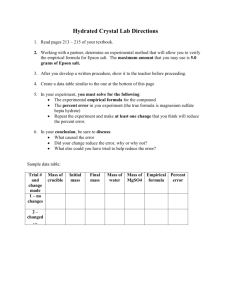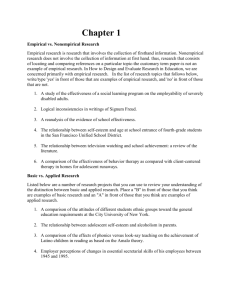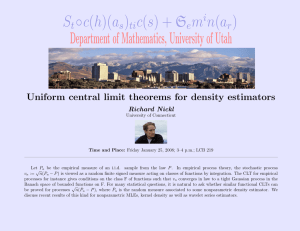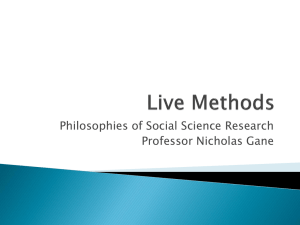Texas Tech University School of Law T E
advertisement
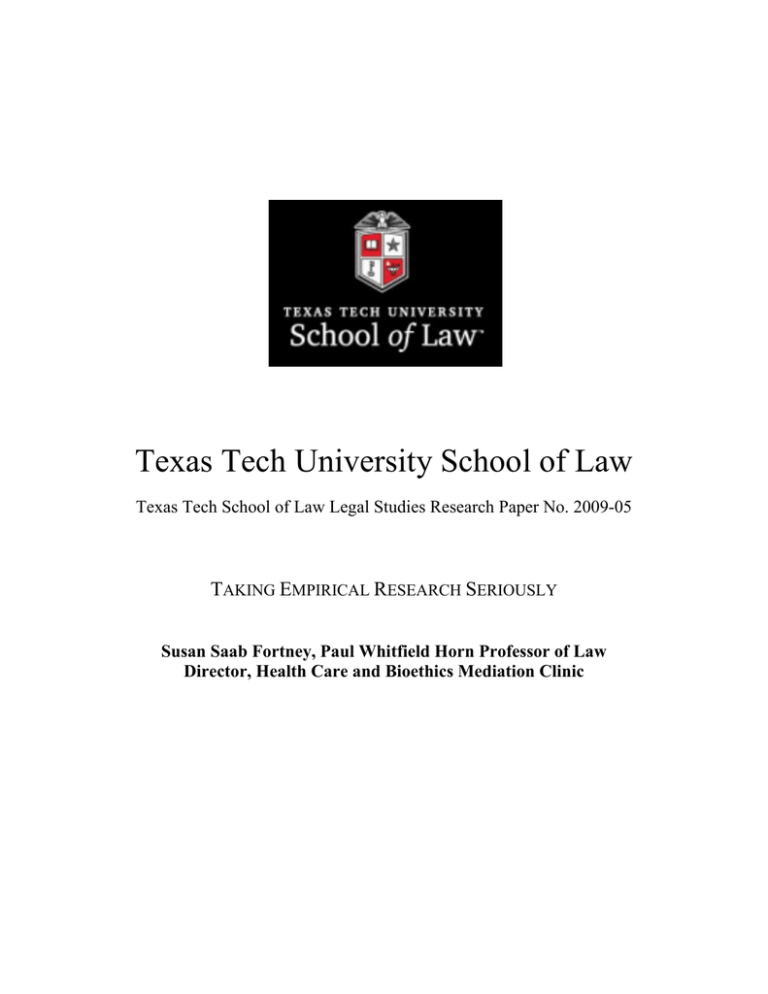
Texas Tech University School of Law Texas Tech School of Law Legal Studies Research Paper No. 2009-05 TAKING EMPIRICAL RESEARCH SERIOUSLY Susan Saab Fortney, Paul Whitfield Horn Professor of Law Director, Health Care and Bioethics Mediation Clinic Cite as 22 Geo. J. Legal Ethics (forthcoming 2009) Taking Empirical Research Seriously BY SUSAN SAAB FORTNEY* INTRODUCTION Over a decade ago Harry Edwards, Judge with the U.S. Court of Appeals for the District of Columbia Circuit, sparked a debate when he criticized the legal academy and legal education. While dissecting trends in law school curriculum and scholarship, Judge Edwards characterized the “disjunction” between the legal academy and legal profession. In a controversial law review article, he lamented: I fear that our law schools and law firms are moving in opposite directions. The schools should be training ethical practitioners and producing scholarship that judges, legislators, and practitioners can use. The firms should be ensuring that associates and partners practice law in an ethical manner. But many law schools — especially the socalled “elite” ones — have abandoned their proper place, by emphasizing abstract theory at the expense of practical scholarship and pedagogy. Many law firms have also abandoned their place, by pursuing profit above all else. While the schools are moving toward pure theory, the firms are moving toward pure commerce, and the middle ground — ethical practice — has been deserted by both. This disjunction calls into question our status as an honorable profession . . . My view is that if law schools continue to stray from their principal mission of professional scholarship and training, the disjunction between legal education and the legal profession will grow and society will be the worse for it.1 This indictment provided an excellent springboard for serious examination of the role of scholarship in legal discourse and the connection between scholarly endeavors and the ethical practice of law.2 * Paul Whitfield, Horn University Professor, Texas Tech University School of Law. The author thanks Professors Milton C. Regan, Jr., Jeffrey D. Bauman, and Carole Silver for the invitation to participate in the symposium on empirical legal research. The author also appreciates the comments and assistance provided by Professors Regan and Silver, as well as the members of The Georgetown Journal of Legal Ethics. 1. Harry T. Edwards, The Growing Disjunction Between Legal Education and the Legal Profession, 91 MICH. L. REV. 34, 34-41 (1992). 2. See Harry T. Edwards, The Growing Disjunction Between Legal Education and the Legal Profession: A Postscript, 91 MICH. L. REV.2191, 2192-93 (1993) (recounting the Cite as 22 Geo. J. Legal Ethics (forthcoming 2009) Cite as 22 Geo. J. Legal Ethics (forthcoming 2009) 2 THE GEORGETOWN JOURNAL OF LEGAL ETHICS [VOL. 21:0000 Some scholars retorted pointedly and quickly, challenging Judge Edwards’ characterization of purely theoretical scholarship as “impractical.”3 More recently, the evolving body of empirical legal scholarship may cast doubt on whether Judge Edwards would characterize such research as “impractical.” Specifically, this essay considers how empirical research on the legal profession can actually bridge the divide between theory, social science, and the ethical practice of law. After providing background information on the growing field of empirical legal research, Part I of this essay focuses on developments in empirical legal research on lawyering. Part II discusses how collaboration with practitioners and other stakeholders can help researchers address challenges related to accessing data. Once data are obtained, Part III suggests how dissemination and sharing of research can link the academy and practicing lawyers. The conclusion urges a collaborative course of action for legal ethics scholars who want their research to be taken seriously by members of the academy, the practicing bar, regulators of the legal profession, and lawyer organizations. I. BURGEONING FIELD OF EMPIRICAL RESEARCH ON THE LEGAL PROFESSION In 1993, Professor Robert W. Gordon suggested that empirical social research was the “most neglected and ridiculously undervalued as well as the most potentially fruitful branch of legal studies.”4 Within a few years the interest in empirical research dramatically grew.5 By 2006, one “strong and widespread reaction” in academic circles as well as the popular legal press and national news media). Notably, the Michigan Law Review published a symposium devoted to the subject of “growing disjunction.” Symposium, Legal Education, 91 MICH. L. REV. 1921 (1993). 3. Richard A. Posner, The Deprofessionalization of Legal Teaching and Scholarship, 91 MICH. L. REV. 1921, 1928 (1993) (questioning the wisdom of evaluating legal scholarship on the basis of “utility”); George L. Priest, The Growth of Interdisciplinary Research and the Industrial Structure of the Production of Legal Ideas: A Reply to Judge Edwards, 91 MICH. L. REV. 1929, 1944 (1993) (urging that we attempt to understand the reasons for increased specialization in the types of research and then promoting “appreciation of the cooperative relationship between the academy and the bar toward the end of improving our system . . .”). 4. Robert W. Gordon, Lawyers, Scholars, and the “Middle Ground,” MICH. L. REV. 2075, 2085 (1993) (responding to Judge Harry Edwards’ critique of trends in legal scholarship). 5. Various scholars connected to the Law and Society Association and American Bar Foundation contributed to the growth and prestige of empirical legal research. For a fascinating history of the Law and Society Association and personal stories of the protagonists, see Bryant Garth & Joyce Sterling, From Legal Realism to Law and Society: Reshaping Law for the Last Stages of the Social Activist State, 32 LAW & SOC’Y REV. 409 (1998). Cite as 22 Geo. J. Legal Ethics (forthcoming 2009) Cite as 22 Geo. J. Legal Ethics (forthcoming 2009) 2008] TAKING EMPIRICAL RESEARCH SERIOUSLY 3 commentator referred to empirical legal scholarship as the “next big thing in legal intellectual thought.”6 Chronicling the growing enthusiasm for empirical legal studies (ELS) within law schools, Professor Elizabeth Chambliss in a 2008 article identifies the following developments: Since 2004, law schools have seen the emergence of the Journal for Empirical Legal Studies, the Conference on Empirical Legal Studies, the Society for Empirical Legal Studies and the ELS blog. The number of law-review articles reporting and referencing empirical research has grown, and the top law schools are establishing special centers for empirical research. In 2006, the American Association of Law Schools devoted its annual meeting to the topic of empirical scholarship. The same year saw the first “ELS Ranking” of law schools.7 Concomitantly with the general growth of the ELS movement, scholars increasingly used empirical methods to study the legal profession and legal ethics concerns.8 Over the last two decades, the number of empirical projects increased and the subject matter of empirical studies expanded. The subject matter ranged from discrete treatment of particular ethics issues, such as conflicts issues and screening,9 to more general 6. Tracy E. George, An Empirical Study of Empirical Legal Scholarship: The Top Law Schools, 81 IND. L.J. 141 (2006). Professor George uses the following conceptualization of “empirical legal scholarship” (ELS): “ELS, as the term is generally used in law schools, refers to a specific type of empirical research: a model-based approach coupled with a quantitative method.” Other empiricists see this perspective as too narrow. Id. 7. Elizabeth Chambliss, When Do Facts Persuade? Some Thoughts on The Market for “Empirical Legal Studies,” 71 LAW & CONTEMP. PROBS. 17, 22-23 (2008) (persuasively arguing that ELS is good for socio-legal scholarship and that ELS is “well positioned to serve as a voice of authority in public-policy debates, and as a counterweight to political lobbyists in the market for data”). 8. Some groundbreaking works received a great deal of attention. E.g., ROBERT NELSON, PARTNERS WITH POWER: THE SOCIAL TRANSFORMATION OF THE LARGE LAW FIRM (1988) (a book based on a study of large Chicago law firms) and MARC GALANTAR & THOMAS PALAY, THE TOURNAMENT OF LAWYERS: THE TRANSFORMATION OF THE BIG LAW FIRM (1991) (using data and the promotion to partner tournament model to analyze the exponential growth of law firms); compare Marc Galantar & William Henderson, The Elastic Tournament: A Second Transformation of the Big Law Firm, 60 STAN. L. REV. 1867, [] (2008) (relying on empirical evidence in suggesting an “elastic tournament” model). 9. E.g., Lee A. Pizzimenti, Screen Verité: Do Rules About Ethical Screens Reflect the Truth About Real-Life Law Firm Practice, 51 U. MIAMI L. REV. 305 (1997); Susan P. Shapiro, If it Ain’t Broke . . . An Empirical Perspective on Ethics 2000, Screening, and the Conflict-of-Interest Rules, 2003 U. ILL. L. REV. 1299 (2003) (based on data gathered 3 Cite as 22 Geo. J. Legal Ethics (forthcoming 2009) Cite as 22 Geo. J. Legal Ethics (forthcoming 2009) 4 THE GEORGETOWN JOURNAL OF LEGAL ETHICS [VOL. 21:0000 projects devoted to studying organizational structures and dynamics. A large percentage of the empirical research on the legal profession studied issues related to career paths, professional choices, and lawyer satisfaction.10 A number of empirical works also related to practice in large law firms.11 Researchers devoted less attention to studying the work, ethics, and concerns of lawyers who work in-house or in solo or small firm settings.12 Using the two-hemisphere typography of practice suggested by Professors John Heinz and Edward Laumann, various empirical researchers have studied lawyers in firms that represent organization clients rather than studying lawyers in the hemisphere of lawyers who provide “personal services to individual and small businesses.”13 through interviews with Chicago firm lawyers with responsibility for dealing with conflicts-of-interest issues). 10. E.g., Kenneth G. Dau-Schmidt & Kaushik Mukhopadhaya, The Fruits of Our Labors: An Empirical Study of the Distribution of Income and Job Satisfaction Across the Legal Profession, 49 J. LEGAL EDUC. 342 (1999) (using a data set of university of Michigan graduates to analyze the distribution of pecuniary and non-pecuniary benefits across the legal profession). Various publications have used data from a national longitudinal study of law graduates called After the J.D., a project co-sponsored by the National Association of Law Placement Foundation for Law Career Research and Education and The American Bar Foundation. For information on the results of the study, see Ronit Dinovitzer et al., After the JD: First Results of a National Study of Legal Careers (2004), NALP Found. For Law Career Research and Educ. & The Am. Bar Found., http://www.americanbarfoundation.org/uploads/cms/documents/ajd.pdf. See also Ronit Dinovitzer & Bryant G. Garth, Lawyer Satisfaction in the Process of Structuring Legal Careers, 41 LAW & SOC’Y REV. 1 (2007). 11. See, e.g., Elizabeth Chambliss & David Wilkins, The Emerging Role of Ethics Advisors, General Counsel, and Other Compliance Specialists in Large Law Firms, 44 ARIZ. L. REV. 559 (2002) (study based on information obtained in focus groups and interviews with ethics advisors, general counsel, or other compliance specialists drawn from a non-random sample of thirty-two firms ranging in size from seventy-five to 1,000plus lawyers); Kimberly Kirkland, Ethics in Large Law Firms: the Principle of Pragmatism, 35 U. MEM. L. REV. 631 (2005) (examining firm ethics by analyzing information collected during in-depth interviews of lawyers in large law firms). 12. See, e.g., Leslie C. Levin, The Ethical World of Solo and small Law Firm Practitioners, 41 HOUS. L. REV. 309 (2004). Using data gathered through interviews of forty-two lawyers in New York City, Professor Levin explores how lawyers in solo and small firm practices learn professional norms and solve ethical questions. See also Stephen Daniels & Joanne Martin, It was the Best of Times, It was the Worst of Times: The Precarious Nature of Plaintiff’s Practice in Texas, 80 TEX. L. REV. 1781 (2002) (drawing on information gathered in ninety-six in-depth interviews with Texas plaintiffs’ lawyers and a large-scale mail survey with 554 responses, the article discusses the effect of market forces in the 1990s). 13. See Posting of William Henderson to ELS Blog, Great Qualitative Research on Personal Services Lawyers, http://www.elsblog.org/the_empirical_legal_studi/2006/10/great_qualitati.html (Oct. 3, 2006, 12:13pm EST) (providing a synopsis of works based on sociological research involving lawyers who represent individuals and small businesses). Cite as 22 Geo. J. Legal Ethics (forthcoming 2009) Cite as 22 Geo. J. Legal Ethics (forthcoming 2009) 2008] TAKING EMPIRICAL RESEARCH SERIOUSLY 5 Although some researchers have used questionnaires and quantitative analyses, a number of studies on the legal profession have relied on interviews or ethnographic methodologies. Some scholars reject the characterization of this work as “empirical,” maintaining that the work is not systematic and subject to replication.14 Others take a more expansive view of empirical research, asserting that there is enough room in the tent to accommodate both qualitative and quantitative approaches.15 For the purposes of this essay, I use the term “empirical legal research” to include the rich body of work that uses qualitative approaches, as well as those studies that use quantitative methods. Regardless of the methodology used, all empirical researchers face common challenges when studying the legal profession. In a 1999 essay, Professor David Wilkins questions law schools’ systematic and pervasive “failure to study and teach about the legal profession.”16 The essay critically examines the commonly articulated reasons why law schools cannot effectively study and teach about the profession. In discussing what makes empirical research more difficult than traditional types of scholarly endeavors, Professor Wilkins identifies the following constraints: lack of funding, a limited number of legal academics qualified to conduct empirical research, and a “disinclination” of lawyers to disclose information to researchers.17 I posit that collaboration with practitioners and other stakeholders is a vital ingredient for addressing these concerns. The following section focuses on the challenges encountered when seeking access to data in research related to legal ethics and lawyering. II. OBTAINING COOPERATION AND ACCESSING DATA 14. See, e.g., Tracey E. George, An Empirical Study of Empirical Legal Scholarship: The Top Law Schools, 81 IND. L.J. 141 (2006) (referring to “empirical legal research” as a “model-based approach coupled with a quantitative method”); Lee Epstein & Gary King, The Rules of Inference, 69 U. CHI. L. REV. 1, 15 (2002) (asserting that “serious problems of inference and methodology abound everywhere we find empirical research in law reviews and in articles written by members of the legal community”). 15. In comparing methodological divisions and orientations, Professor Elizabeth Chambliss refers to the “Big Tent” approach embraced by New Legal Realism scholars who propose an “expansive and open-minded” approach to socio-legal research. Chambliss, supra note 7, at 37-38. 16. David B. Wilkins, The Professional Responsibility of Professional Schools to Study and Teach About the Profession, 49 J. LEGAL EDUC. 76, 88 (1999). 17. Id. at 88-92. 5 Cite as 22 Geo. J. Legal Ethics (forthcoming 2009) Cite as 22 Geo. J. Legal Ethics (forthcoming 2009) 6 THE GEORGETOWN JOURNAL OF LEGAL ETHICS [VOL. 21:0000 Methodological experts caution researchers to guard against various types of bias.18 To avoid bias, a researcher may approach research subjects, maintaining a distant stance. Unlike some fields in which social scientists may seek to maintain objective distance from research subjects, researchers studying the legal profession generally recognize the importance of communicating with practitioners and various stakeholders. This connection may be difficult to establish if practicing lawyers are unwilling or reluctant to share information with researchers. Some lawyers may be reticent to participate in empirical studies involving legal ethics due to concerns related to disclosing information related to client or firm confidences.19 In actuality, client confidentiality concerns do not pose an insurmountable barrier. As noted by Professor Wilkins, clients may waive confidentiality in some cases or researchers can pursue lines of inquiry where confidentiality concerns are less important.20 Others may be unwilling to respond to researchers’ inquiries if doing so will cast the individual lawyers and their organizations in a negative light. If lawyers are reluctant to “wash their dirty linen in public” or otherwise share sensitive information, researchers might use various methods to protect confidentiality – “ranging from anonymity to joint decision making over the information that can be revealed in particular contexts.”21 To formulate a workable approach to confidentiality concerns and to enlist the participation of lawyers, researchers should actively consult practitioners at all stages of a project, starting with the development of the research agenda. Often empirical researchers conduct pre-tests before they launch into their full-scale studies. At this point, the researcher likely has developed the research agenda and designed the study methodology. Rather than wait until the pretest to consult practicing lawyers, empirical researchers should communicate with practitioners and other stakeholders at the outset of the project. Practitioners and interested parties, such as representatives of lawyer organizations and malpractice insurers, may provide invaluable guidance as researchers formulate their research plans. Early feedback from stakeholders can help researchers determine what issues concern practitioners and explore the best approach to studying particular matters. Consultation of stakeholders includes asking practicing lawyers, bar 18. E.g., Martyn Hammersley & Roger Gomm, Bias in Social Research, Social RESEARCH ONLINE (1997) http://www.socresonline.org.uk/2/1/2.html (examining different interpretations and types of “bias”). 19. Lawyers may be concerned that sharing information with researchers could breach duties to preserve confidential information related to clients or their firms. 20. Wilkins, supra note 166, at 91. For example, client confidentiality issues may not arise in studies related to career paths of lawyers or institutional policies. Id. 21. Id. Cite as 22 Geo. J. Legal Ethics (forthcoming 2009) Cite as 22 Geo. J. Legal Ethics (forthcoming 2009) 2008] TAKING EMPIRICAL RESEARCH SERIOUSLY 7 leaders, regulators, malpractice insurers, and client representatives what they want to know.22 While an empirical project is first being conceptualized, decision-makers with funding bodies and law schools may comment on the proposed study plan. Depending on the nature of the research, law students might also be consulted.23 Funding bodies, law school foundations, and legal profession centers may have advisory board members who may provide input on research that they find to be worthwhile. These members can also advise researchers on the value and feasibility of a research plan and proposed methodology. Advisory groups for legal ethics and profession centers already guide the work and research conducted by particular centers.24 These advisory bodies may be willing to provide feedback to researchers who are not connected to the law school that houses the particular center. Members of bodies, such as the Law Firm Working Group at Indiana University School of Law, might also provide feedback.25 On-going dialogue with practitioners and other stakeholders fosters appreciation for the value of empirical work. With information on the proposed empirical projects and dissemination of findings from studies that have been conducted, stakeholders can recognize the multi22. For example, firm leaders are keenly interested in knowing more about the decisions of corporate counsel to retain outside counsel. A Corporate Purchasing Study Project conducted by researchers with the Harvard Law School Program on the Legal Profession will provide valuable information on the ways that legal department assess, procure, and manage outside legal services. Harvard Law School Program on the Legal Profession, Corporate Purchasing, http://www.law.harvard.edu/programs/plp/pages/ corporate_purchasing.php (last visited Apr. 14, 2009). 23. Law students could be consulted for projects related to professional choices and career paths. A researcher interested in seeking student input might contact leaders of “Building a Better Legal Profession,” a group founded by Stanford Law Students in 2007. The group’s website states that it is a “national grassroots movement that seeks market-based workplace reforms in large private law firms.” See Building a Better Legal Profession, About Us, http://www.betterlegalprofession.org/mission.php (last visited Apr. 23, 2009). 24. For example, Harvard Law School Program on the Legal Profession includes the Center on Lawyers and the Professional Services Industry that is “devoted to the empirical study of legal practice and the delivery of legal services.” See Harvard Law School Program on the Legal Profession. Center on Lawyers and the Professional Services Industry, http://www.law.harvard.edu/programs/plp/pages/professional_services.php (last visited Apr. 23, 2009). The distinguished members of the Center’s Advisory Board advance one of the Center’s primary goals in forging a connection between the academy and the profession. Id. 25. “The Law Firms Working Group is a research network of scholars that seeks to advance our knowledge and understanding of law firms, and private practice generally, through systematic and collaborative empirical research.” The Law Firms Working Group, Purpose Statement, http://firm.law.indiana.edu/about/index.shtml (last visited Apr. 14, 2009). 7 Cite as 22 Geo. J. Legal Ethics (forthcoming 2009) Cite as 22 Geo. J. Legal Ethics (forthcoming 2009) 8 THE GEORGETOWN JOURNAL OF LEGAL ETHICS [VOL. 21:0000 dimensional benefits of empirical research. They will learn that research findings can help inform their choices and assist in evaluating conduct as well as an organizational dynamics and culture.26 Findings from studies can help educators and employers understand what we are doing right and what we can do better.27 Career path research reveals forces that contribute to employee attrition and lawyer mobility.28 Empirical research can examine serious concerns relating to the diversity in lawyer organizations and the experiences of women and lawyers of color.29 Practitioners can also use empirical data to evaluate the effect of policies and procedures.30 Other empirical studies guide firm leaders in evaluating effects of compensation and work systems, as well as structural changes.31 Finally, empirical research can assist lawyers in tracking market trends and gauging the impact of legislation and regulatory changes.32 Lawyers who 26. For example, data obtained in my study on law firm peer review revealed that respondent firms where partners shared an institutional perspective were more likely to implement peer review measures than respondent firms in which firm partners functioned as a confederation of individual practitioners. See Susan Saab Fortney, Are Law Firm Partners Islands Unto Themselves? An Empirical Study of Law Firm Peer Review and Culture, 10 GEO. J. LEGAL ETHICS 271, 309-310 (1997). Using this finding, firm leaders could then take steps to reshape firm culture to stress a team approach and interdependence. 27. The work of Professor Victor G. Rosenblum and Dr. Frances Kahn Zemans illuminates the value of research on understanding culture and professional choices. Rather than speculating on why many law students abandon the pursuit of public interest positions, Professors Zemans and Rosenblum studied the role of law school training and culture in undermining the commitment to public interest work. VICTOR ZEMANS & FRANCES KAHN ROSENBLUM, THE MAKING OFA PUBLIC PROFESSION (1981). 28; e.g., William Henderson, An Empirical Analysis of Lateral Lawyer Trends form 2000-2007: The Emerging Equilibrium for Corporate Law Firms, 22 GEO. J. LEGAL ETHICS __ (forthcoming). 29. E.g., John M. Conley, Tales of Diversity: Lawyers’ Narratives of Racial Equity in Private Firms, 31 LAW & SOC. INQUIRY 831 (2006); Bryant G. Garth & Joyce Sterling, Exploring Inequality in the Corporate Law Firm Apprenticeship: Doing the Time, Finding the Love, 22 GEO. J. LEGAL ETHICS __ (forthcoming). 30. For example, the findings from my study on partner peer review produced quantitative data on the extent to which firms had policies and procedures to monitor the conduct of firm principals. Fortney, supra note 26. Firm lawyers, such as loss prevention counsel, could use these results when advocating that the firm implement peer review measures, such as procedures for rendering opinion letters. 31. E.g., Elizabeth Chambliss, The Professionalization of Law Firm In-House Counsel, 84 N.C. L. REV. 1515 (2006) (examining the evolution of the “firm counsel” position in law firms). 32. See, e.g., Susan Saab Fortney, Chicken Little Lives: The Anticipated and Actual Effect of Sarbanes-Oxley on Corporate Lawyers’ Conduct, 33 CAP. U. L. REV. 61 (2004) (symposium piece discussing the findings of a mixed methodology study on the effects of the enactment on Sarbanes-Oxley legislation on the conduct of corporate and securities lawyers); see also CHRISTINE PARKER, STEVE MARK, & TAHLIA GORDON, RESEARCH REPORT, ASSESSING THE IMPACT OF MANAGEMENT-BASED REGULATION ON NSW Cite as 22 Geo. J. Legal Ethics (forthcoming 2009) Cite as 22 Geo. J. Legal Ethics (forthcoming 2009) 2008] TAKING EMPIRICAL RESEARCH SERIOUSLY 9 understand the practical application of empirical findings should be more willing to personally participate in empirical studies and to encourage others to do so. Engaged practitioners may be able to assist researchers in identifying issues and addressing those that can impair full access to data. Candid discussions with practitioners may reveal that they are seriously concerned about the anonymity of information obtained in empirical studies. To address this concern, a researcher may point to the fact that an Institutional Review Board reviewed and approved the protocol, including proposed safeguards for guarding the anonymity of responses. Depending on the circumstances, such assurances of anonymity may not provide enough comfort to practicing lawyers, especially when the information sought is highly sensitive. In that case, a body of researchers could formulate a research protocol that is thorough and recognized as a best practice for handling and scrubbing data.33 Thereafter, practitioners may be more inclined to participate in a study that is conducted in accordance with the best practice or protocol recognized, and even monitored, by the body of researchers. After assisting with the development of the research agenda and methodology design, stakeholders can also provide assistance by encouraging participation. For example, leaders of private firms and lawyer organizations can easily circulate emails to affiliated lawyers, urging them to participate. If the research design does not call for a random sample, firm and organizational leaders may be willing to circulate a link to an online survey instrument. Consultations with stakeholders may reveal other concerns that stakeholders may have about empirical research. For example, some practitioners have indicated that they would like to see more quantitative work dealing with law firm practices and procedures. Discussions among researchers and practitioners can also identify questions that should be asked in assessing both quantitative and qualitative research. III. DISSEMINATING AND SHARING RESEARCH FINDINGS Once we have tdata, what do we do with study findings? Disseminating findings is an integral part of fostering a connection with INCORPORATED LEGAL PRACTICE (2008), http://www.lawlink.nsw.gov.au/lawlink/olsc/ll_olsc.nsf/vwFiles/Research_Report_ILPs.p df/$file/Research_Report_ILPs.pdf (reporting on the results of a multi-faceted study of the effects of the new regulatory regime for Incorporated Law Practices in Australia). 33. Professor Milton Regan suggested the possibility of a protocol or standards of handling confidential information. Telephone Interview with Professor Milton Regan, Professor of Law, Georgetown University Law Center (Dec. 16, 2008). 9 Cite as 22 Geo. J. Legal Ethics (forthcoming 2009) Cite as 22 Geo. J. Legal Ethics (forthcoming 2009) 10 THE GEORGETOWN JOURNAL OF LEGAL ETHICS [VOL. 21:0000 practicing lawyers. A starting point is to provide a report to all persons who participated in the study – both consultants and respondents. This can be done through circulation of copies of law review articles based on the study. In addition to writing traditional law review articles, researchers could reach a wider audience by publishing shorter pieces in practitioner journals. Press releases along with blog and list-serve postings can announce the completion of the study and refer interested parties to publications reporting on the research. Such notices inform members of the practicing bar as well as other researchers. Finally, continuing legal education (CLE) programs provide an outlet for discussion of research findings. For my last national study, I found CLE programs to be a very worthwhile avenue for sharing results with practitioners.. The crossprofession study, sponsored by the National Association of Law Placement Foundation, examined work-life issues encountered by lawyers in private practice as well as corporate and government practices.34 Through a mixed methodology approach, we obtained data from managing and supervising attorneys and developed best practices for employers who want to assist lawyers in obtaining more balance in their work and personal lives. Three different CLE programs gave me a chance to reach different sectors of practitioners who could use the study results. First, I presented the results at a Hildebrant International program on Associate Development and Retention. In that session, I shared study findings and best practices, including cost-efficient work-life initiatives that improve the quality of life for lawyers and may improve the quality of work for clients. Attendees could use study results in designing workable programs for their law firms. Thereafter, a CLE program sponsored by the Texas Young Lawyers’ Association gave me the opportunity to communicate with junior attorneys who were evaluating employers and professional choices. Finally, I spoke to a large group of general counsel at the Texas General Counsel Forum. In that presentation, I explored how work-life issues affect the legal services delivered by outside counsel. Relying on study results related to the billable derby contributing to ethical lawyers leaving practice, inefficiency, and the adverse effect on the quality of work, I urged general counsel to consider firms’ billable hour expectations and attrition rates when the general counsel retain outside legal counsel. Following my 34. For a discussion of the study methodology, results, and recommendations, see SUSAN SAAB FORTNEY, IN PURSUIT OF ATTORNEY WORK-LIFE BALANCE: BEST PRACTICE IN MANAGEMENT (Paula Patton ed. 2005). For a symposium article that draws on findings from the NALP Foundation and an earlier survey of law firm associates, see Susan Saab Fortney, The Billable Hours Derby: Empirical Data on the Problems and Pressure Points, 33 FORDHAM URB. L.J. 171 (2005). Cite as 22 Geo. J. Legal Ethics (forthcoming 2009) Cite as 22 Geo. J. Legal Ethics (forthcoming 2009) 2008] TAKING EMPIRICAL RESEARCH SERIOUSLY 11 presentation, a few general counsel advised me that the empirical data provided a platform for them to formally consider associate retention and billable hour practices of firms they hire. The data relating to inefficiency and attrition not only inform general counsel, but empower general counsel in evaluating such issues when hiring outside counsel. Firm leaders troubled by the current cycle of pay raises and increases in billable hour requirements to fund the associate pay increases, can also use study findings when advocating for workable reduced hour arrangements that allow associates to work less and get paid less, while still remaining on the promotion and partnership track. As these examples illustrate, educational programs for practitioners provide an excellent forum for researchers to share study results that can be used by lawyers in the trenches. Researchers should also share results with other academics, those who conduct empirical research, and those who work in related areas.35 Communications should indicate whether other researchers can access data. This helps foster a network of researchers and future collaborations. Providing detailed information also makes our work more transparent and increases confidence in results if others can access data. To enhance availability, legal profession and ethics centers could act as repositories for duplicate copies of study material such as disks containing data that have been scrubbed of identifying information. A researcher network could also develop standards or criteria for guiding researchers and assessing the design and reliability of both quantitative and qualitative research. Finally, cooperation among scholars can help address the inadequate number of persons conducting empirical research on the legal profession. Interested researchers could organize programs that focus on developing empirical research skills36 and providing connections to social scientists with training in areas they want to research.37 Many academics work in universities housing numerous experienced empiricists.38 Unfortunately, law professors who want to recruit the 35. For example, professors who teach Business Entities classes may be interested in studies relating to the organizational structures of law firms. Gender or Race courses could include discussions t of studies on diversity in the legal profession. 36. See Wilkins, supra note16, at 90 (suggesting that law professors do not need an advanced degree in statistics to conduct some types of empirical research such as indepth interviews or cataloguing lateral mobility of black partners in a particular city). 37. For three empirical studies that I conducted, I retained the services of a Ph.D. in statistics who had worked as the director of a state bar research office. Research professionals who work with lawyer organizations may provide assistance or referrals to statisticians experienced in conducting research on the legal profession. 38. Pointing to the array of social scientists who have been brought into law schools, Professor Wilkins argues that there is “no reason why the methodological and conceptual 11 Cite as 22 Geo. J. Legal Ethics (forthcoming 2009) Cite as 22 Geo. J. Legal Ethics (forthcoming 2009) 12 THE GEORGETOWN JOURNAL OF LEGAL ETHICS [VOL. 21:0000 assistance of social scientists may face institutional barriers to doing so, such as internal accounting and grant administration practices that complicate such collaboration. A network of empirical researchers may provide information on models of collaboration and joint ventures between law professors and researchers in different parts of the university. CONCLUSION In his article on disjunction between legal academy and law practice, Judge Edwards challenged both academics and practitioners to devote more attention to legal ethics training and professionalism. He suggested that practical scholarship constitutes a vital link between law schools and legislators and practitioners who need guidance.39 Using this connotation of practical legal scholarship, empirical research on the legal profession squarely fits in the category of practical scholarship when it addresses practitioner concerns. Depending on the hypotheses and research questions, empirical research may directly address ethics concerns. Such research informs practitioners by providing data on organizational dynamics, systems, and cultures that undermine ethical practice and those that encourage lawyers to act professionally in serving clients and the public good. The efficacy of ELS on the legal profession will largely turn on the extent to which practitioners and researchers collaborate in a cycle of cooperation and communication. At the outset of projects, consulting practitioners increases the likelihood that the studies will tackle matters of concern to practitioners. Such exchanges provide opportunities for researchers to get feedback on structuring research that will yield meaningful responses. Once a study is completed, researchers should widely communicate its findings. When practitioners see the value of empirical research they will be more inclined to participate and to encourage others to do so. Practitioners who have confidence in study results will also be more willing to facilitate access to data. Understanding this, a network of researchers could develop standards or guidelines for empirical research on lawyering and legal ethics concerns, including protocols for maintaining confidentiality. Programs, such as this symposium on empirical research on the legal profession, provide an excellent expertise necessary to study the profession cannot be brought in as well.” Wilkins, supra note16, at 91. 39. As stated by Judge Edwards, “‘Practical’ scholarship constitutes a vital link from the law schools to our system of justice – to legislators, administrators, judges, and practitioners who need thorough, thoughtful, concrete legal advice.” Edwards, supra note 1, at 57. Cite as 22 Geo. J. Legal Ethics (forthcoming 2009) Cite as 22 Geo. J. Legal Ethics (forthcoming 2009) 2008] TAKING EMPIRICAL RESEARCH SERIOUSLY 13 opportunity for researchers and practitioners to explore how we can develop models and guidelines for future studies and collaborations. Thanks to the organizers of this symposium and the members of The Georgetown Journal of Legal Ethics for their foresight and effort in bringing together persons interested in exploring empirical research as a bridge between the academy and those dedicated to the ethical law practice. 13 Cite as 22 Geo. J. Legal Ethics (forthcoming 2009)
